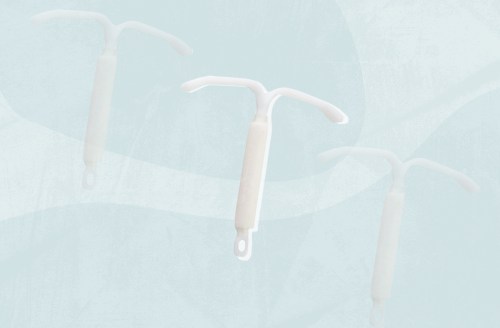One of the most empowering things I’ve ever done was taking control of my reproductive health—which for me meant finding a birth control option that I actually liked. I tried many different kinds of birth control—including several types of the pill and Nuvaring—before making the decision to get an IUD. This was brought on in part by concern over the future of women’s healthcare in this country, and in part by my hatred of tracking when my Nuvaring needed to be put in and taken out. (Plus, not to be TMI, but it loved to fall out at the most inconvenient times…)
IUDs are considered one of the most effective forms of birth control—over 99 percent effective, to be exact. Once it’s properly inserted into your uterus, you’re protected from pregnancy for up to 10 years, depending on what type you get. You don’t have to remember to take it every day, like the pill, or put it in every month, like the Nuvaring. (Just remember, it will not protect you from STIs!)
But still, IUDs are a far cry from the arm gel contraceptive that’s currently being tested for men. (I have thoughts about that.) As with any form of BC, it comes with its own potential side effects that can be different for everyone. Some people can get worse acne after going on a hormonal IUD (fun!), while some people either “enjoy” heavier periods or stop getting them altogether. And the whole insertion process is no cakewalk, either.
With all that in mind, I asked a few other women what they wish they had known (the pros and cons!) before getting an IUD. Here’s what they said.
1. “I got terrible cystic acne.”
“The one thing I wish I had known before getting my Mirena (aside from the fact that the insertion can hurt so bad you feel clammy and nauseous) was that it would give me cystic acne. I generally have clear skin, so when these deep, painful cysts began showing up on my chin, I was flabbergasted. Knowing this ahead of time wouldn’t have changed my decision to get an IUD, but still. It would’ve been nice to know so I could have stocked up on gallons of Renee Rouleau Anti-Bump Treatment. Luckily, after about six months I stopped getting the cysts, and while they—for lack of a better term—sucked, my IUD was worth it.” —Allie
2. “I was not prepared for how painful it would be afterwards.”
“Getting my IUD was a straightforward process. I went to my gynecologist, got an exam to make sure that I was healthy, and a consultation to go over my options. Before my consult, I was already leaning towards Mirena. However, my gynecologist was diligent about explaining the differences between my options, and the possible side effects from each.
“Two weeks later I was back in her office to get my IUD inserted. I did not expect how painful it would be. I had one friend who said she was in and out of the doctor’s office in 20 minutes with minor discomfort so I expected something similar, but what I experienced was much more severe than minor discomfort. I was in so much pain that I had to spend an hour and a half in the office before I could drive back to my apartment.
“I spent the next couple of days suffering from horrible cramps, and the next four months with inconsistent and extremely heavy periods with “spotting” in between (think a heavy two day period). After about four months, my periods became more regular. I stopped spotting, and after about eight months my periods became super light, and now they only last a couple days. It’s amazing.
“I love my IUD. I love not having to worry about my birth control, and the freedom from having to take a pill every night. It was uncomfortable for a couple months, but two years later I know I made the right decision.” —Amy
3. “It took months for my body to adjust to it.”
“It was a horrible experience, but I was out of options. I have interstitial cystitis, which is a chronic bladder condition that can cause bladder and pelvic pain and inflammation. My periods flare it up quite badly, so I have to be on birth control. However, my body tends to reject most birth controls after a few months, so I had gone through the whole list of products. The IUD was my last chance before more drastic treatment measures had to be made.
“I like to think I have an okay pain tolerance, but this was nothing like I’d ever experienced. Once it was placed I could barely move because I was super nauseous. I had to take the rest of the day off and the subsequent week after that I was in a lot of pain with a constant heating pad by my side. It was the worst cramps I’ve ever had—it was like my body was trying push the device out. If it wasn’t my last option, I don’t know if I would have done it.
“I’ve had it for about a year now, and it took about six months before my body settled in. The first three months were rough, and then the next few months after that I had pretty heavy irregular bleeding, and then about four months ago things settled out. I’m pretty happy with it now, but you have to be in it for the long game.” —Rachel
4. “I stopped getting my periods.”
“When I got my IUD, it was actually really painful getting it put in. More than I would have expected and it was a little uncomfortable at first because there’s these strings inside you that are kinda stiff at first. Over time they soften, and I’ve honestly forgot that I even have it sometimes.
“If there was one thing I wish I had known prior, it’d be that some people stop getting their period when they have it in. I go months without a period now and it’s pretty great. I would have gone with this birth control route sooner had I known that.” —Justine
5. “My periods actually got worse.”
“I got the Paraguard, the non-hormonal, copper-based IUD, in 2014 after my birth control pills started causing blood pressure spikes. I still have it in and probably will until I have to get a new one in 2024.
“I think something I wish I had known, or at least mentally prepared for, was the return of my ‘real’ period. I had been on the pill so long (around eight years) that I had forgotten what periods were like before the help of hormones. I went from three to five day periods with little to no cramping or PMS to a full seven days of fun with some gnarly PMS symptoms. It’s worth it though. I have a super effective type of birth control with the peace of mind that I’m not taking any hormones. Not that I believe hormones are harmful—my body just wasn’t reacting well for whatever reason.” —Ashley
Note: Quotes have been edited and condensed for clarity.
Friendly reminder: do not wash and reuse condoms. Plus, more must-know info about synthetic birth control.
Sign Up for Our Daily Newsletter
Get all the latest in wellness, trends, food, fitness, beauty, and more delivered right to your inbox.
Got it, you've been added to our email list.











